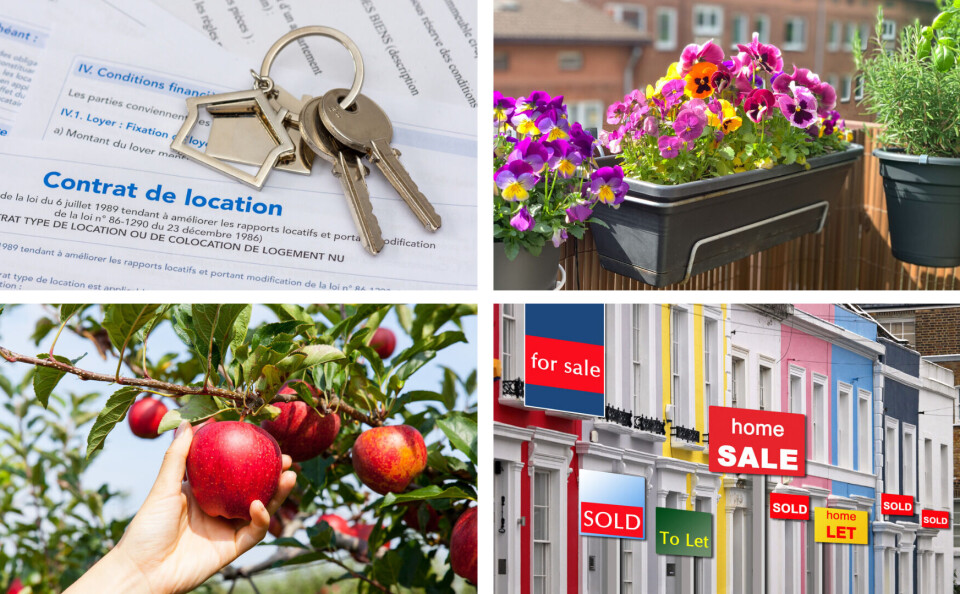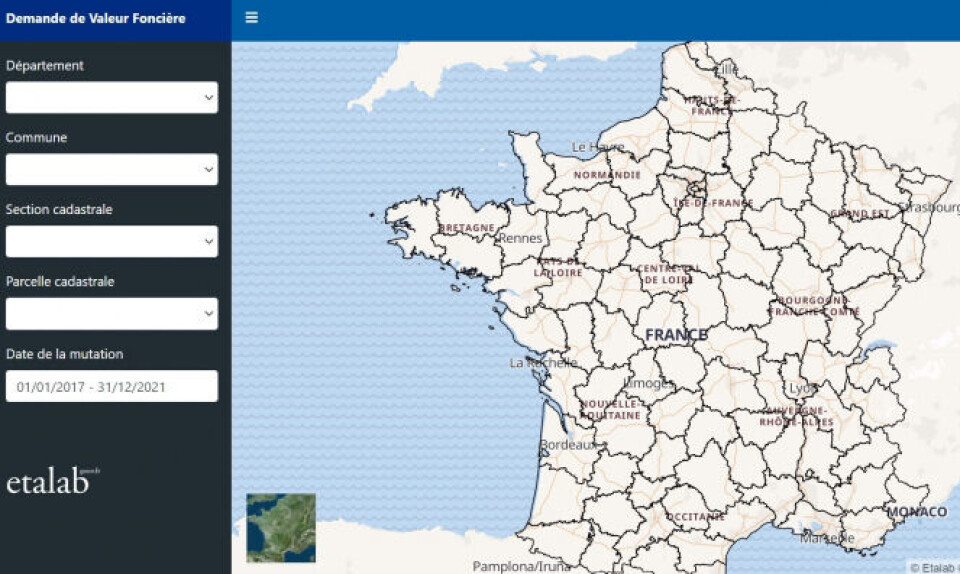-
Neighbour’s dog in France bit ours leading to vet bills: who must pay?
Canine bites to humans must be reported to mairie
-
What are the rules for changing your front door in France?
We review the rules, from planning permission to paint colours
-
Fête des Voisins: 10 million neighbours in France to meet this Friday
2025 marks the 25th edition of solidarity festival, la Fête des Voisins. Revisit our 2016 interview with founder, Atanase Périfan
Buy or rent debate, checking sales data: Five French property updates
We look at how to see what homes near you recently sold for, the rules around taking fruit from a neighbour’s tree and how the property market is faring

Buying property in France only more profitable than renting after nearly 14 years, new study shows
It now takes on average 13 years and eight months before buying a property in France is more economically worthwhile than renting, an increase of eight years from 2021, according to an annual study by real estate broker Meilleurtaux.com.
The study, called ‘buy or rent’, looks at the number of months or years of property ownership required to make the purchase of a primary residence cheaper than renting.
It is based on a property with an average surface area of 70 square metres and studies the market in 32 of the largest cities in France.
In terms of buying property, the study takes into account: the price per square metre, property tax, other costs such as notaire’s fees and average charges per square metre per month – this could be bills, mortgage repayments, insurance, etc.
For renting, it considers: The price of rent and the return on investment that would have been spent on the down payment of a property in case of purchase.
The study makes for unpleasant reading for people considering buying property this year. The average period before buying became profitable in 2021 was five years and eight months, and in 2020 it was just three years and four months.
Maël Bernier, spokesperson for Meilleurtaux, said that since March this year many buyers have given up on trying to buy properties.
“More and more applications are being rejected and no longer meet the criteria for financing [by banks],” she said in a statement about the study.
She said the main issue blocking potential buyers is the taux d’usure.
The taux d’usure is the maximum rate at which a loan can be granted and is set each quarter by the Banque de France as a percentage. Many critics have said that it is set far too low, leading to some 45% of mortgage applications currently being rejected.
Read more about this in our previous property roundup here.
Ms Bernier also said that property prices are still generally increasing around France, while rent prices are remaining relatively stable.
There are disparities between the different cities in France.
Nîmes (Gard), for example, recorded the lowest increase in the period of time by which buying a property is more profitable than renting. It went from one year and four months in 2021 to two years and eight months in 2022.
On the other end of the spectrum is Angers (Maine-et-Loire). The study found that it now takes 28 years before buying a property in the city is more profitable than renting – the same time period as Paris.
This is up from nine years and six months in 2021 and just two years and five months in 2020.
“Purchase prices in Angers have literally exploded,” said Ms Bernier.
“To put it plainly, in 2021 the price per square metre in this city was €3,073, one year later it has risen by more than €400 to €3,478/m2.
“It is a victim of its own success. Like many of its western neighbours, this is what has driven up the price of property: A craze for buying in the face of rents that have remained relatively stable.”
Find out how much properties in your area sold for in the past five years
It is possible to find out how much properties in your area have sold for in the past five years by searching for their valeur foncière on the website DVF.

Credit: Screenshot / DVF
Choose your department and then commune and click on a local area and you will see properties that were sold between January 1, 2017 and December 31, 2021 highlighted in light blue.
For example, this 260 square metre house in Blaye (Gironde) – highlighted in pink – sold for €400,000 in August 2021.

Credit: Screenshot / DVF
Using this tool, Le Figaro was able to find out that an impressive property – the Château de Boutemont in Calvados (Normandy), was sold for €2.3million in 2020 after being put on the market initially for €8million in 2014.
Can I eat fruits from my neighbour’s tree if it overhangs into my garden?
French law makes a distinction between picking fruits directly from the tree and gathering ones that have fallen on the ground.
Article 673 of the Code civil notes that if a neighbour’s tree that overhangs your property produces fruit, you become the legal owner of these fruits if they fall to the ground on your land. You cannot pick them from the tree without your neighbour’s permission.
You also cannot shake the tree or provoke the falling of the fruits – they must fall naturally.
Illegally taking fruits from a neighbour’s tree is technically considered theft in France, with a possible prison sentence of three years and a fine of up to €45,000. However, iIt is highly improbable that a case would ever lead to such an extreme punishment.
Another quirk of the law is that if you and your neighbour share the ownership of the tree, then the fruits should be divided up equally between you.
It is up to you and your neighbour to work out how this is managed.
In most cases, of course, people will probably have no problem with you picking some fruits from their trees if you ask them nicely.
Read more: Can I make my neighbour prune trees that overhang my garden in France?
Price of established properties still rising
The price of non-new build properties (flats and houses) continued its rise in the second quarter of 2022, data from the Notaires de France and French national statistics bureau Insee shows.
However, the prices are increasing slightly less than in previous quarters, with a rise of 6.8% year-on-year.
This rise was 7.3% in the first quarter of 2022.
This slowdown was predicted by the Notaires de France in a report published earlier this year marking property trends, citing rising inflation as a main reason to turn potential buyers off investing in property.
Read more: ‘Slowdown ahead’: Five French property trends from latest notaire data
Read more: MAP: French house price rises continue - how is your area faring?
Non new-build property – called logement ancien in French, is defined as a property that was constructed over five years ago or one that has changed ownership.
Thierry Delesalle, president of the statistics commission of the Notaires du Grand Paris, said that despite the slowdown the “figures are still good”.
He said he expected “several exceptional quarters to be followed by quarters that are perhaps not exceptional but still dynamic”.
House prices have been rising in France, particularly outside of Paris, due to an increase in work from home practices and people looking for more space following the pandemic.
2021 was a record year for the market in terms of sales, coming on the back of a stunted 2020, when sales fell due to the coronavirus pandemic.
That created pent-up demand, and also saw many projects pushed back, adding to the high number of sales last year.
Thomas Lefebvre, scientific director of property price comparison company Meilleurs Agents, said that the trend of people leaving big cities for medium-sized cities is continuing. This is causing these medium-sized cities to grow faster than larger cities such as Paris, Marseille, etc..
“We are on the cusp of a change. The market is holding its breath,” he said.
Plant pots and hanging baskets on balconies
There is no specific, national law that prohibits decorating the balcony of a flat that you rent or own with flower pots, hanging baskets or other garden decorations.
However, occasionally there are local laws.
The main one is a ban on hanging baskets or flowerpots on the outside of the railing (hanging over the street). This is for safety reasons.
Additionally, some buildings will have a specific rule banning this.
To find out if it is the case you should check with your syndic or landlord, or check with your local mairie.
Read more: French property syndics: What can I do if mine stops responding?
Otherwise, to be absolutely sure, avoid hanging any pots or plants over the street and this way you will almost definitely be complying with any rules.
Additionally, it is good advice to fix your plants or pots to something to stop them blowing away or falling.
You – the flat owner or the tenant, whoever lives in the property – is liable for any damage or injury caused by an object from your balcony onto the street.
Related articles
French planning row over ugly McDonald’s ‘site cabin’ extension
Garden pool and veranda taxes, squatters: Four French property updates
Dordogne popularity, winter heating woes: Four French property updates
























